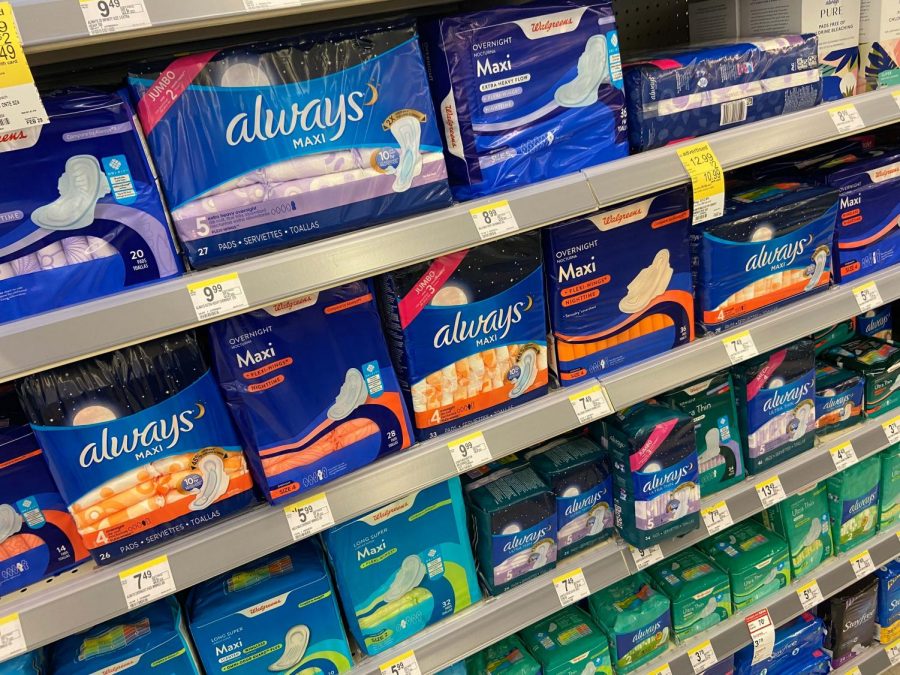Let’s talk about periods
I bleed monthly. So does around half of the world’s population. Periods are a natural and normal function that signify the power of the female body, as well as its ability to produce life. Yet, we weave around and dodge and uncomfortably wince at the culturally taboo subject of a girl’s period. According to a survey of 140 VHHS students, 51.4% of students are either somewhat or extremely uncomfortable when talking about menstruation.
“[Periods are] only talked about, you know, in between, like girls at all,” Rachael Hayden (12) said.
If half the population is uncomfortable and unwilling to talk about periods candidly, prominent issues surrounding periods like the tampon tax, and global issues like lack of access to period products and cultural shaming of menstruating individuals cannot even begin to be addressed. The cultural shaming and disgrace surrounding menstruation also hurts girls’ education in places like India and sub-Saharan Africa; it prevents them from going to school, participating in religious activities, and heightens the possibility of infections, setting them back behind their non-menstruating counterparts.
There is a prominent cloud of taboo surrounding periods. From a study of 97,070 girls in India by the Tata Institute of Social Sciences, 8 in 10 girls reported not being allowed to enter religious shrines while menstruating, and 6 in 10 girls weren’t allowed to touch food in the kitchen; 3 in 10 girls reported being asked to sleep in a separate room. UNESCO reports that in sub-Saharan Africa, 1 in 10 girls miss school because of their period, largely due to the fact that cultural taboo prevents clean facilities where girls can change their menstrual products.
According to a Femme International study in a Nairobi slum, 75% of girls had little idea of what menstruation was before they got their first period. This lack of education surrounding periods led to an increase in reproductive tract infections due to poor menstrual management.
This taboo isn’t just an issue in countries oceans away. I also see the taboo, plain as day, in my own life.
I have two brothers — yet when I’m on my period, the most uncomfortable week of the month, cramping, bloated, and constantly yearning for cheese curds, my Korean immigrant mother forces me not to bring it up. She hides tampon boxes, whispers “do you need a P-A-D” and she once answered that a period is the punctuation at the end of a sentence when my ten-year-old brother was curious.
Aside from being taboo, the topic of a period is often ridiculed and laughed at. My friend mentioned how her mother (also an immigrant) wouldn’t let her brother go out and buy pads for her, even
though she needed them. Both mothers’ behavior are a product of the culture they grew up in, a culture where it’s taboo to mention a natural bodily function.
“I think a lot of people kind of make fun of the issue or don’t take it seriously,” said Ariel Shifrin (9). “I’ve seen people making fun … like [using] the ‘are you on your period’ joke?”
How can periods be normalized if they are the butt of a joke for high schoolers? How can the cultural stigma be promptly addressed, tackled, and dismantled? How can one simply make people comfortable around this topic?
The first step is to talk about periods normally, plainly because they are. The more you talk about a topic and raise awareness, the more “mainstream” or normalized it becomes. Avoiding euphemisms like “time of the month” or “Aunt Flo” can aid this process of normalization. If you’re an non-menstruating human being, learn to empathize and recognize that monthly menstruation is not to be ridiculed. In this article alone, I’ve said the word “period” a grand total of 18 times in an attempt to start to normalize menstruation and get people talking.
This cultural taboo needs to be smashed. Many cultures believe menstruators to be dubbed “unclean” or “dirty” when bleeding. A period is the sign of life, as period blood is made up of shed cells from a body preparing to house a baby. Menstruation showcases the ability of a body to produce living, breathing human beings. A period is powerful — down with the stigma!

